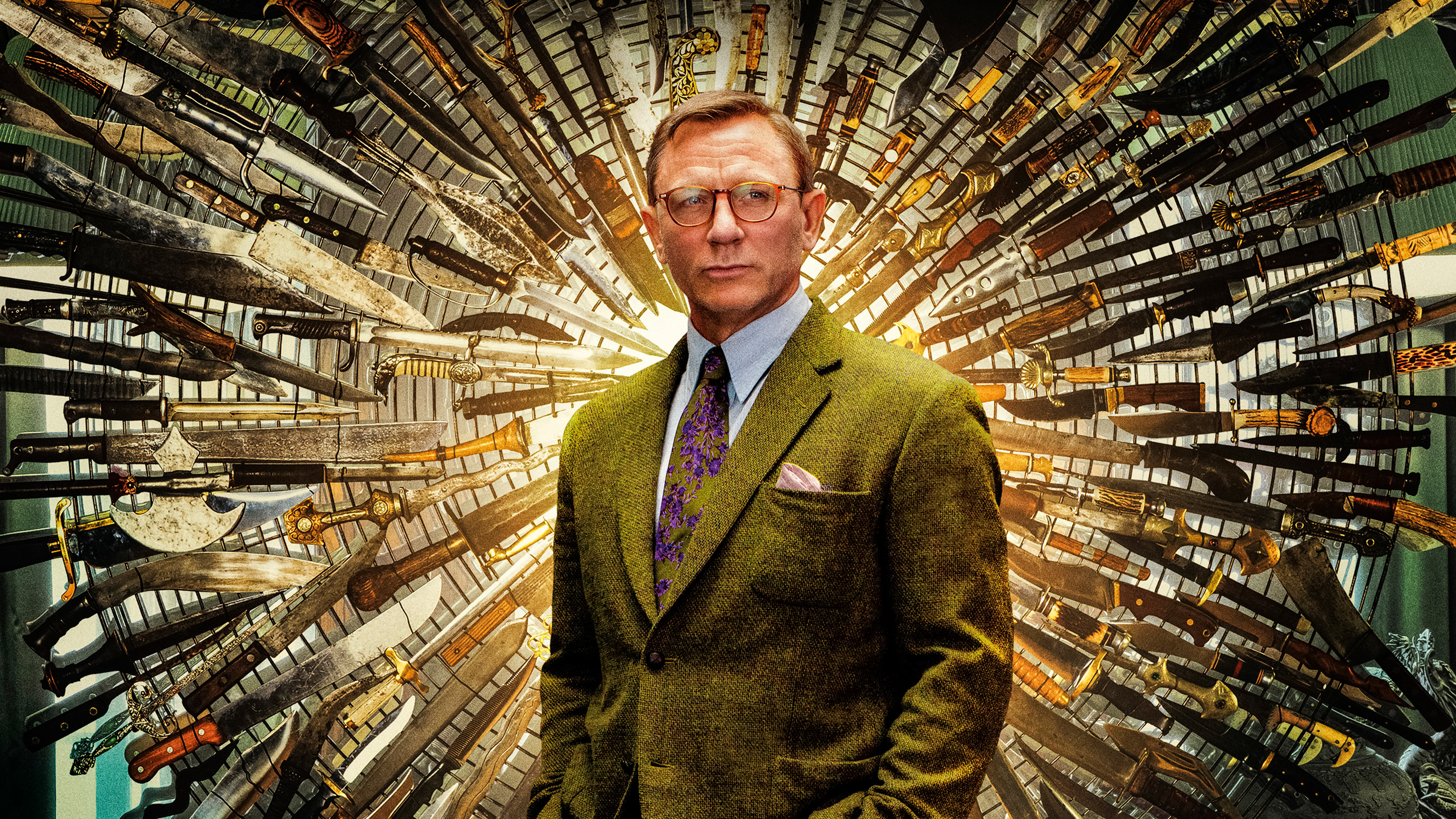
**Spoilers**
The classic Agatha Christie-style whodunnit murder mystery story is a genre that I have, admittedly, had limited exposure to in contemporary Hollywood productions, let alone one that is set in our present-day Trump-governed America. It was a genre I had always associated with the Cluedo board game growing up as well as the infamous Simpsons two-part episode ‘Who Shot Mr. Burns’. When I had heard that Rian Johnson’s latest cinematic outing, Knives Out would present a more playfully comedic, theatrical take on the whodunnit genre, I was initially rather apprehensive. This was mainly due to Johnson’s previous film Star Wars: The Last Jedi (2017) having been met with possibly the most controversial and divisive critical reception of any film that I had heard of. But I was pleasantly surprised to find that Knives Out was a thoroughly entertaining and well-crafted production with a wonderfully talented cast, masterful use of staging, intricately detailed and theatrical set-pieces interwoven with a devilishly tongue-in-cheek brand of comedy and deft use of classic murder-mystery tropes.
In a grand theatrical fashion, the opening scene sets the main stage of the film immediately, the mansion of the prestigious Thrombey family in all its lavish splendour. Here we see the mansion’s housekeeper, Fran, as she attempts to awaken the family’s patriarch, Harlan Thrombey (Christopher Plummer), whom she is shocked to find in his study to be lying in a pool of his own blood, a single moment that would promptly set the events of the film into motion. The film then cuts to one week following the tragedy when detective Benoit Blanc (Daniel Craig) begins an investigation into the events surrounding it, despite the police ruling Harlan’s death as a suicide. It is during this first act that we are introduced to our main lead, the family nurse, Marta Cabrera (Ana de Armas) along with the various colourful personalities of the Thrombey family, the latter of whom give conflicting accounts of the incident in order to save face.
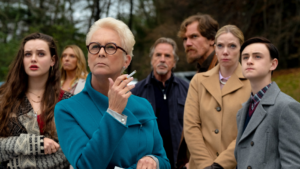
A clan of arrogant, narcissistic, upper-crust human leeches, the Thrombeys, while shallow, self-serving, manipulative and outright despicable at times, are each a delight to watch in their own right, and provide a good bulk of the film’s comedic moments. Their every interaction is depicted as an over-the-top caricature of rich, white, conservative American family gatherings with every member constantly at each other’s throat over the pettiest of reasons, whether it be political melodrama or heated family gossip. From resident lifestyle guru Joni (Toni Colette) stealing from her daughter’s education fund to the frequently foreshadowed affair between eldest daughter Linda (Jamie Lee Curtis) and Richard (Don Johnson). Some of them, such as Meg (Katherine Langford), may put on the façade of friendliness towards Marta, but as soon as they discover that Harlan left everything in his will to her, they immediately turn on the young nurse, making it clear that all of them are just different rotten apples grown from the same poisoned family tree.
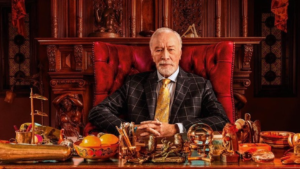
The now-departed patriarch of the family, Harlan Thrombey is initially depicted as being just as bad as the rest of his clan. Through indulging his family with his vast wealth by letting them scrounge off of him, he had essentially cultivated their avarice and narcissism. But later on, during his interaction with Marta, he shows a great deal of regret and self-pity over allowing his family to depend on the security of his wealth instead of letting them follow their own path, telling her that he had “kept his family beneath him”. The scene between Harlan and Marta had established that they were close friends and that Harlan may have viewed her as more of a daughter to him than any of his family, which makes his subsequent death following the scene to be surprisingly tragic. He trusts Marta so much that even with the knowledge that she had accidentally ‘poisoned’ him, he goes to great and convoluted lengths moments before his death to ensure that his young nurse and best friend would remove any evidence that could potentially incriminate her. He even went as far as to entrust his will to Marta alone, knowing her own financial struggles, while writing his own family out of the will entirely as a last-ditch effort at teaching them self-reliance. Suffice to say, none of them took it particularly well, especially not the family’s black sheep, Ransom.

An obnoxious layabout virtually despised by the rest of his family, Hugh Ransom Drysdale (Chris Evans) enters the film during its second act, following the funeral and the investigation. As an outcast of his family, Ransom is shown to be a condescending apathetic underachiever and initially displays a disarmingly charming disposition towards Marta, persuading her to play along with him by painting himself as a pariah among his clan. However, this is a thinly-veiled guise as he quickly proves himself to be just as petty and manipulative as everyone else in his family, made all the more apparent during the final act when it’s revealed that he was the mastermind behind Harlan’s murder and had attempted to frame Marta for it. But while it initially seemed like he had thoroughly planned everything out, by inadvertently confessing his cold-blooded murder of the housekeeper Fran, he was inevitably hoisted by his own petard in the most hilariously satisfying way possible. After getting well-used to seeing Chris Evans as the idealistic heroic patriot, Captain America, It’s quite refreshing to see him let loose as a character who’s essentially the polar opposite; an arrogant, conniving, foul-mouthed man-child who may seem like a cunning Machiavellian schemer at first, but ultimately fails to think things entirely through. It probably says a lot about his character that even his father’s dogs instinctively harass him on sight!
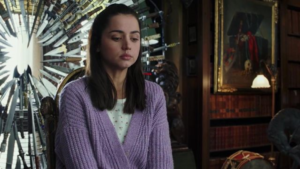
With such a snobbish, elitist, blue-blooded American household, it seems only natural that the film provides a direct contrast to them with its lead players. The main lead is the noble-hearted family nurse, Marta Cabrera, who is good-natured and sincere to such a comical degree that she has a medical condition that causes her to throw up upon telling even the slightest fib. Her own version of Pinocchio’s nose, if you will. Coupled with her friendship with Harlan, this makes her the last person you’d ever assume to have been responsible for his death. Despite her virtuous and bashful nature, however, she is shown to be neither too naïve nor meek enough to be completely exploited by the people around her. For instance, she was smart enough to expose Ransom for murdering Fran by lying about her being alive à la barfing all over him, despite his previous attempts at manipulating her kindness. In spite of her guilt complex and her timid disposition, her quick initiative and her strong friendship with Harlan had paid off significantly with her earning not only his colossal fortune, but also granting her complete control of the household of abusive human parasites that had put her through the wringer.

Of course, an Agatha Christie-inspired whodunnit murder-mystery wouldn’t be complete without a cartoonishly oddball, yet disarmingly brilliant sleuth to accompany it, and the Southern-Fried detective, Benoit Blanc, fits the role to a T. While I did find Daniel Craig’s attempt at a Southern accent to be painfully jarring throughout most of the film, I do somewhat understand why Craig would deliberately exaggerate this accent. When you think about Agatha Christie’s characters, she had always written them with a sense of eccentricity and comical exaggeration of their demeanor/appearances. For an obvious example, look no further than the 5’4 tall Hercule Poirot and his notoriously well-groomed moustache. What I assume Craig attempted to do through his character of Benoit Blanc was to emulate a similar more tongue-in-cheek exaggeration of Southern-accented characters to stand out from the rest of the cast, as well as to pay homage to Christie’s eccentric detective characters. As for Benoit Blanc himself as a character, his crackpot personality and unorthodox methods initially appear to work against him and paint him as rather incompetent at his job. However, come the film’s final act, this turns out to be a ruse as he had managed to precisely figure everything out. After viciously calling out the Thrombey family for the conniving vultures that they are, Blanc goes on a gloriously madcap rant revealing in meticulous detail the true events surrounding Harlan’s death and caps it all off with the deep and profound analogy of “a donut hole in a donut’s hole.” While he seems to operate on a different plane of reality than most people of his profession, Benoit Blanc’s mad genius is made abundantly clear during this final moment, making for a delightfully outlandish personality, albeit with a rather irritating vernacular.
A fundamental detail that makes Knives Out a thoroughly engaging and well-realized piece of cinematic storytelling is the careful attention it pays towards its dynamically shifting narrative twists. Those who go into the film with an attentive mind and an eye for intricate detail will appreciate its wealth of rapid-fire twists-within-twists. The first significant narrative twist being that Marta had accidentally poisoned Harlan via a morphine overdose, revealed midway through the film is initially established to the audience as the status quo and the most likely outcome that had led to his death. At this point, the film shifts it’s gears from a traditional whodunnit to somewhat of a cat-and-mouse game as Marta desperately attempts to cement her innocence by throwing Blanc off her trail and burying all traces of potentially incriminating activity that evening. Further narrative twists and curveballs include Harlan leaving everything in his will to Marta turning the family against her along with an anonymous blackmail letter she received reading “I know what you did.” However, nothing is as it seems in the world of Knives Out, and before a weary and hopeless Marta can make a damning confession of her murder to the rest of the family, Benoit Blanc, crackpot detective extraordinaire, at last, unravels the grand final mystery, significantly altering the audience’s initial perspective of the film’s prior events.
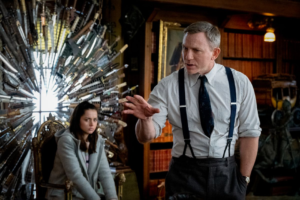
The film’s final act consists of Blanc meticulously and elaborately unfurling the tangled web of mystery that had taken place on the night of Harlan’s death. He figured out that Ransom, who was later revealed to have anonymously hired him knew about Harlan’s will before it was read and attempted to reverse it, and that before Harlan’s death, Ransom had used a syringe to switch the medication in the vials and took the naloxone, a vital antidote from Marta’s bag as a safety measure. Blanc also acknowledged that Marta’s skills as a nurse had enabled her to recognize the morphine bottle, even without reading the label, revealing that she didn’t poison Harlan at all and had administered a proper morphine dose, with the proof of this being Harlan’s normal blood levels in his full toxicology report that Blanc had found. Thus Blanc secures Marta’s innocence in unveiling the first important piece of this mystery; by concluding that Harlan was perfectly healthy and that his death was ultimately a suicide. Blanc then goes on to further unveil Ransom’s elaborate scheme to pin Harlan’s death on Marta by deducing that he had burned down the medical examiner’s office along with Harlan’s blood samples and had sent Marta on a wild goose chase with an anonymous email, leading to her finding Fran in critical condition, whom Ransom had overdosed with morphine after she attempted to blackmail him with her knowledge of his actions. In a clever little reveal, Marta points out that Fran’s final words were not “you did this”, but rather “Hugh did this”, as Ransom had stated earlier that “only the help calls him Hugh.” This intricately woven revelation therefore concludes that Ransom, embittered and petty about losing his grandfather’s fortune had been pulling the strings behind the events surrounding Harlan’s death the entire time.
After Blanc had masterfully laid this reveal out, Marta still had one final trick up her sleeve that would put Ransom away for good. She receives a phone call from the hospital and says that Fran is still alive and can give a statement. This prompts Ransom to make the idiotic decision of admitting to murdering Fran in a spiteful rant against Marta. Immediately after, Marta weaponizes her condition as she vomits all over Ransom, revealing her statement to be a lie, confirming Fran’s death and implicating Ransom in her murder in one fell swoop. She outplays him at his own game in quite possibly the most hilarious way imaginable. With nothing left to lose, Ransom finally snaps and seals the deal on his downfall by attempting to stab Marta with a retractable prop knife in a dramatic and humorous climax. Realizing he had just made a complete muck of his entire operation, Ransom utters a final resigned “shit” before being tackled by police and apprehended. To close off the film, Marta looks down from atop the balcony of the Thrombey household, calmly standing above the toxic backstabbing clan of entitled miscreants that had put her through two hours of hell as she takes a well-deserved sip out of Harlan’s coffee mug appropriately labelled; “My house. My rules. My coffee.”

Through Knives Out, Rian Johnson had made a bold attempt at emulating a classic Agatha Christie-style Whodunnit murder mystery within modern-day America, and he had delivered just that in spades. Not only does it take advantage of its stellar cast by having them play compelling roles outside of their comfort zone, but it also makes an art form out of its use of narrative twists and plot revelations throughout its run. Some minor issues I ran into included the social commentary regarding class division in the movie being a tad too on the nose in places, particularly with many of the Thrombeys being blatant caricatures of over-privileged white folk, as well as Harlan’s suicide being rendered completely pointless by the end. All that being said, Knives Out remains a delightfully witty and artfully hysterical murder mystery throughout its run, and following the divisive reception of The Last Jedi, I can safely say that Rian Johnson has successfully returned to form with this unique outing.
